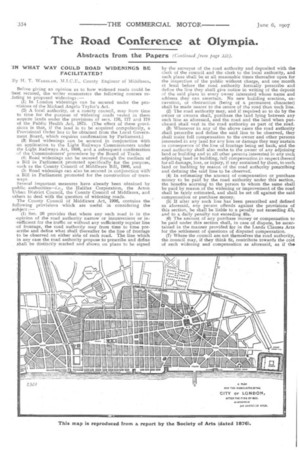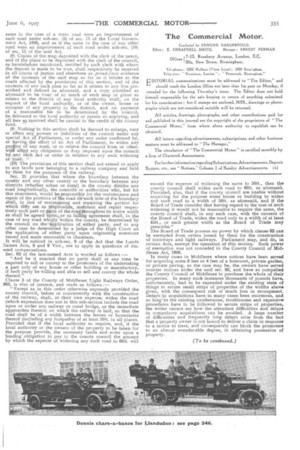The Road Conference at Olympia.
Page 18

Page 19

If you've noticed an error in this article please click here to report it so we can fix it.
Abstracts from the Papers (Continued from page 335).
IN WHAT WAY COULD ROAD WIDENINGS BE FACILITATED?
By H. T. WAKE.L.A.m, M,I.C.E., County Engineer of Middlesex.
Before giving an opinion as to how widened roads could be [best secured, the writer enumerates the following courses redating to proposed widenings (1) In London widenings can be secured under the pro'visions of the Michael Angelo Taylor's Act. .(2) A local authority, or a county council, may from time to time for the purpose of widening roads vested in them acquire lands under the provisions of secs. 176, 177 and 178 of the Public Health Act, 1875. (The effect of these provisions is that, if the land is to be acquired compulsorily, a Provisional Order has to be obtained from the Local Govern. merit Board, which requires confirmation by Parliament.) (3) Road widenings can be secured in conjunction with .an application to the Light Railways Commissioners under the Light Railways Act, 1896, and a subsequent confirmation of the Commissioners' procedure by the Board of Trade.
(4) Road widenings can be secured through the medium of .a Bill in Parliament promoted specifically for the purpose, such as the County Council of Middlesex Bill, 1906, arid (5) Road widenings can also be secured in conjunction With' .a Bill in Parliament promoted for the construction of tramways.
Several important measures have already been obtained by -public authorities—i.e., the Halifax Corporation, the Acton Urban District Council, the County Council of Middlesex, and others to deal with the question of widening roads. The County Council of Middlesex Act, 1906, contains the following provisions which are useful in considering the subject :—
(1) Sec. 20 provides that where any such road is in the nopinion of the road authority narrow or inconvenient or in. -suffi,cient for the traffic or without any sufficiently'regular line .of frontage, the road authority may from time to time pre-scribe and define what shall thereafter be the line of frontage to be observed on either side of such road. The line which in any case the road authority propose to prescribe and define shall be distinctly marked and shown on plans to be signed by the surveyor of the road authority and deposited with the clerk of the council and the clerk to the local authority, and such plans shall be at all reasonable times thereafter open for the inspection of the public without charge, and one month at least before the road authority formally prescribe and define the line they shall give notice in writing of the deposit of the said plans to every owner interested whose name and address they can ascertain. No new building erection, excavation, or obstruction (being of a permanent character) shall be made nearer to the centre of the road than such line.
(2) The road authority may, and if required so to do by the owner or owners shall, purchase the land lying between any such line as aforesaid, and the road and the land when purchased shall vest in the road authority as part of the road.
(3) Whenever in any of the above cases the road authority shall prescribe and define the said line to be observed, they shall make full compensation to the owner and, other persons interested in any land for any loss or damage they may sustain in consequence of the line of frontage being set back, and the road authority shall also make to the owner of any adjoining land or building and to all other persons interested in any such adjoining land or building, full compensation in respect thereof for all damage, loss, or injury, if any sustained by them, to such land or building by reason of the road authority prescribing and defining the said line to be observed.
(4) In estimating the amount of compensation or purchase money to be paid by the road authority under this section, the benefits accruing to the person to whom the same shall be paid by reason of the widening or improvement of the road shall be fairly estimated, and shall be set off against the said com_pensation or purchase money.
(5) If after any such line has been prescribed and defined as aforesaid, any person offends against the provisions of this section, be shall be liable to a penalty not exceeding £5, and to a daily penalty not exceeding 40s.
(6) The amount of any purchase money or compensation to be paid under. this section shall, in case of dispute, be aseertained in the manner provided for in the Lands Clauses Acts for the settlement of questions of disputed compensation.
(7)• Where the council are not themselves the road authority, the council may, if they think fit, contribute towards the cost of such widening and compensation as aforesaid, as if the same in the case of a main road were an improvement of such road under sub-sec. (2) of sec. 11 of the Local Government Act, 1888, and as if the same in the case of any other road were an improvement of such road under sub-sec. (10) of sec. 11 of the said Act.
(8). Copies of the map deposited with the clerk of the peace, and of the plans to be deposited with the clerk of the council, as hereinbefore mentioned, certified by such clerk with whom the deposit is made to he true, shall respectively be received in all courts of justice and elsewhere as prima-facie evidence of the contents of the said map so far as it relates to the roads affected by the provisions of this section, and of the contents of any such plan so far as it relates to any line prescribed and defined as aforesaid, and a copy (certified as aforesaid to be true) of so much of such map or plans as relates to the district of any local authority shall, on the request of the local authority, or of the owner, lessee or occupier of any property in the district, and on payment of a reasonable fee to be determined by the council, be delivered to the local authority or person so applying, and all fees ,sqreceiyed shall be carried to the credit of the county fund.
(9) Nothing in this section shall be deemed to enlarge, vary or affect any, powers or liabilities of the council under any special Act LA Parliament, or under any order confirmed by, or having, the effect of an Act of Parliament, to widen any porton of any road, or to relieve the council from or other
wis any obligation or duty imposed upon the council. by„any nth Act or order in relation to any such widening or.
(10) (10) The provisions of this section shall not extend or apply to any lands now belonging to a railway company and held by them for the purposes of the railway.
Sec. 21 provides that where the boundary between the county and any other county or the boundary between any districts (whether urban or rural) in the county divides any road longitudinally, the councils or authorities who, but for this enactment, would 11,e, responsible for the maintenance and repair of the portions of the road ein'each side of the boundary shall, in lieu of maintaining and repairing the portion for which thy are so respOnsible, maintain and repair respectively such part or Farts of the road*roughout its entire width as shall be agreed upon or as failfiig agreement shall, in the case of any road wholly within the county, be determined by the council on the'4plication of either party, and in any other case he determined by a judge of the High Court on the application of either party upon originating summons issued and made returnable in chambers.
It will be noticed .in sub-sec. 6_ of the Act thatthe Lands llauses Acts, 8 and 9 Vict., are to apply in questions of disuted compensations.
Sec. 92 of the last-named Acts is worded as follows :— " And be it enacted that no party shall at any time be required to sell or convey to the promoters of the undertaking a part only of any house or other building or manufactory, if such party be willing and able to sell and convey the whole thereof."
Clause 5 of the County of Middlesex Light Railways Order, 903, is also of interest, and reads as follows
Except as in this order otherwise expressly provided the county council, before or concurrently with the construction of the railway, shall, at their own expense, widen the road (which expression does not in this sub-section include the road upon or under any railway or canal bridge, or the immediate approaches thereto) on which the railway is laid, so that the road shall_ be of a width between the fences or boundaries thereof (including any footpaths) of at least 50ft, in all places. Provided that if the local authority so require, and, if the local authority or the owners of the property to be taken for the purpose provide, the necessary lands and enter upon a binding obligation to pay to the county council the amount by which the expense of widening any such road to 60ft. will exceed the expense of widening the same to 50ft., then the county council shall widen such road to 9ft. as aforesaid. Provided, also, that if the county council are unable without acquiring for the purpose some house or building to widen any such road to a width of 5fIft. as aforesaid, and if the Board of Trade consider that having regard to the cost of such widening it would not -be reasonable to require the same, the county council shall, in any such case, with the consent of the Board of Trade, widen the road-only to a width of at least 45ft., or such greater width as the Board of Trade may prescribe."
The Board of Trade possess no power by which clause 92 can be exempted from orders issued by them for the construction of tramways and light railways. Parliament may, and do, in certain Acts, exempt the operation of this section. Such power of exemption was not conceded in the County Council of Mid. dlesex Act; 1906.
In many cases in Middlesex where notices have been served foracquiring some 3 feet or 4 feet of a forecourt, private garden, or private paving, as the case may be, the owners have served counter notices under the said sec. 92, and have so compelled the County Council of Middlesex to purchase the whole of their properties. In many such instances thousands of pounds have, unfortunately, had to be expended under the existing state of things to secure small strips of properties of the widths above given, with the consequent risk of much loss in recoupment. Delays in acquisitions have iri many cases been enormous, and so long–as the existing cumbersome, troublesome and expensive procedures have to be followed to secure strips of properties, the writer cannot see how the attendant difficulties and delays in compulsory acquisitions can he avoided. A large number of difficulties and frequently long delays arise from the fact that a property owner is not bound to deliver a claim in response to a notice to treat, and consequently can block the promoters to an almost unendurable degree, in obtaining possession of property.






















